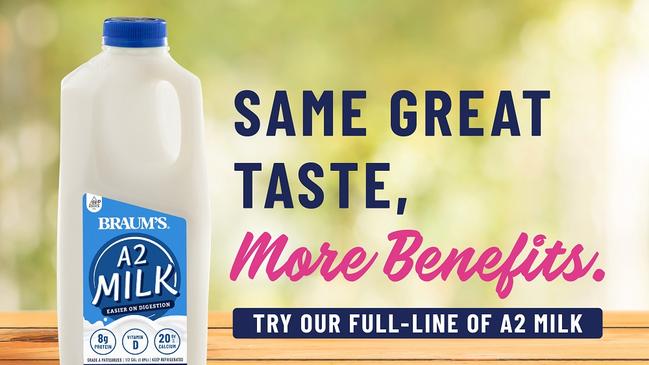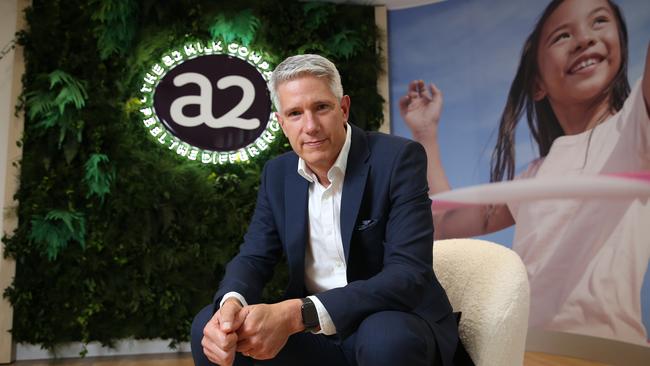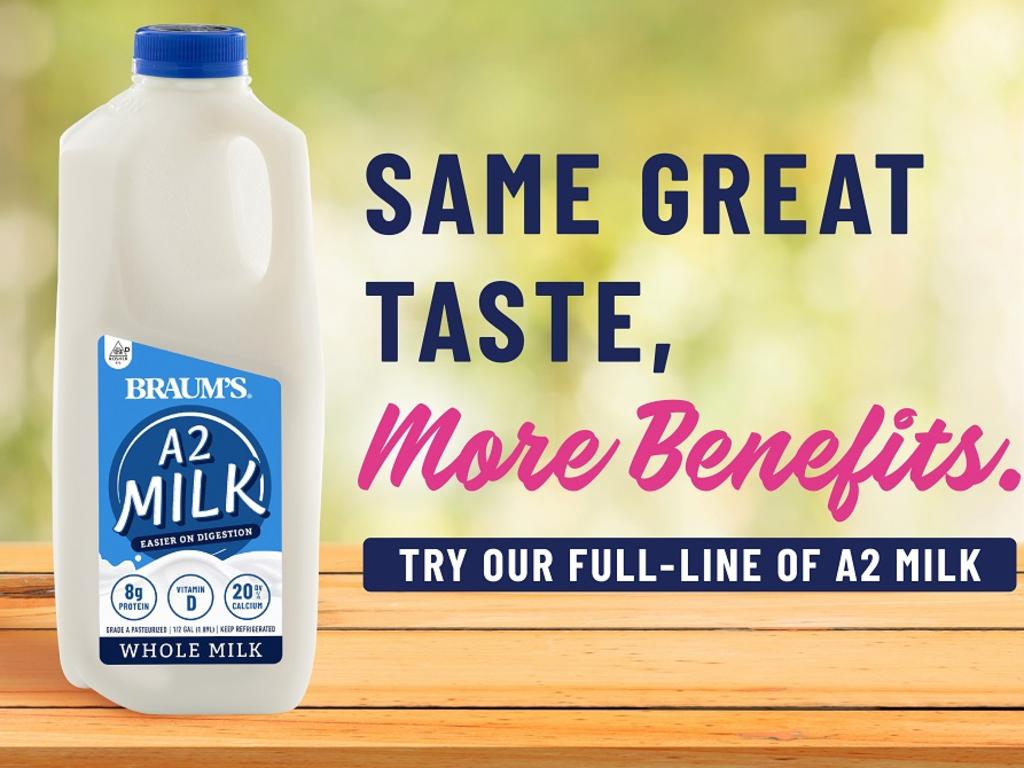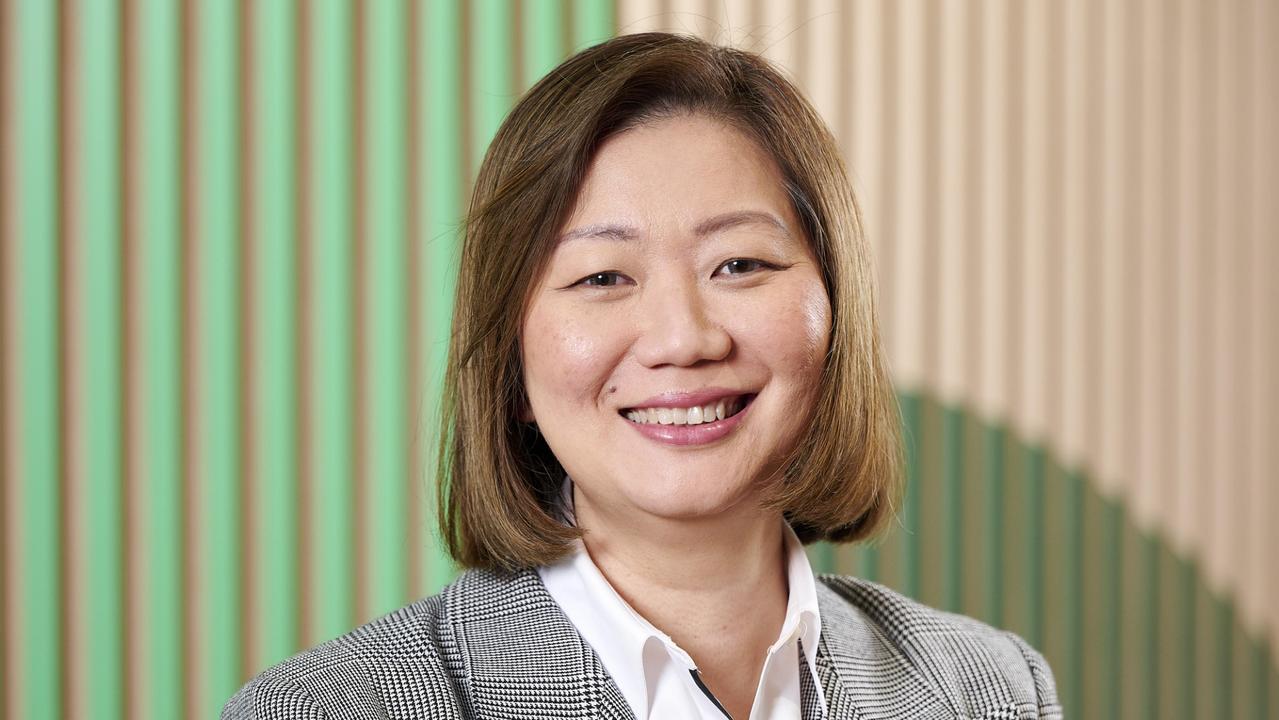A2 Milk scores legal victory against US family-owned fast-food chain Braum’s
First it took on dairy giant Lion, then the ABC, now A2 Milk has settled its trademark spat with Oklahoma fast-food chain Braum’s.

Trans-Tasman dairy company A2 Milk has settled its trademark dispute with Oklahoma family-owned “old fashioned ice cream parlour” chain Braum’s, firing a shot over the bow of any would-be copycats.
As A2’s market capitalisation — once twice as big as Qantas at $13bn — has plummeted more than 60 per cent to $4.9bn, the company has retained its stance of “vigorously protecting” its trademark, with the Braum’s settlement rounding off a hat-trick.
Already, the company has claimed legal victories against Lion, the ABC and now Braum’s, which husband and wife team Bill and Mary Braum founded in 1968 and grew to 280 restaurants across Oklahoma, Kansas, Texas, Missouri and Arkansas.
The terms of the settlement are confidential, but US dairy industry sources say that it is understood that Braum’s has been given a grace period to alter its website and product labels to say “A1 free” rather than “A2 Milk”.
“The A2 Milk Company and Braum’s have settled their dispute regarding Braum’s sale of their brand of A1 Free milk and the A2 Milk trademarks in place in the United States,” A2’s US chief executive Blake Waltrip said.
“We will always vigorously protect our trademark rights in the A2 Milk trademarks and are happy we have been able to reach a mutual agreement with Braum’s.”
Braum’s lawyer, Clifford C. Dougherty III, did not elaborate, telling The Australian: “The case settled.”
For the past 12 years Braum’s had been building its own herd of dairy cows carrying the A2 beta casein protein. Last year it began selling its own range of A2 dairy products alongside its burgers, crinkle-cut fries and club sandwiches, spruiking the same claim as A2 Milk, saying it was “easier on digestion”.
Despite being a relatively small operation, Braum’s efforts didn’t escape the attention of A2 Milk, which sent a cease and desist letter to the Oklahoma company last May.
Braum’s retaliated by lodging a complaint in the US District Court, arguing it should be able to use A2 on its products because it was a generic term referring to a protein, not the trans-Tasman company.
It was akin to the ugg boot trademark dispute, albeit in reverse. Ugg is a generic term in Australia and New Zealand, but UGG trademark owner, US giant Deckers Outdoor Corporation, has vigorously defended its intellectual property outside those countries.
Two years ago, a federal jury in Chicago sided with Deckers, ordering Australian Leather, a small Sydney-based footwear company, to pay $450,000 in statutory damages to Deckers for selling sheepskin boots that infringed its UGG trademark.

It is not the first time the A2 Milk Company has moved to defend its trademark. It sued then Japanese-owned food and beverage giant Lion in 2014 after Lion rebranded its Pura milk products to say “naturally contains A2”. Tests revealed Pura contained 50-70 per cent of its beta protein content, with the A1 protein comprising the remainder. The A2 Milk Company and Lion eventually settled out of court in 2017.
In 2015, A2 then took on the ABC, accusing its program The Checkout of breaching the national broadcaster’s code of conduct by failing to provide balance, as well as reporting factual errors and inaccuracies. An episode of The Checkout gave A2 Milk “a B minus for science” and suggested claims made by the company were ”bullshit”, prompting A2 to issue a writ prepared by prominent lawyer Allan Myers QC.
A2 and The ABC eventually settled.
The Braum’s case comes after A2’s shares have been under pressure following the evaporation of the lucrative Chinese daigou — or trusted shopper — market. After hitting a record high of $20.05 last July, A2 shares have since plummeted to $6.73.
More than 35 per cent was wiped off its half-year net profit in February, which fell to $NZ120m ($111.6m), after Covid-19 travel bans and supply chain disruption triggered the collapse of the daigou trade.
A2’s new chief executive David Bortolussi said at the company’s half-year results that he expected the daigou market will begin to recover in the next six months.
He said the company had to strike the right balance between supplying mainstream cross-border e-commerce channels and the daigou resellers to support the bounce back.
“The cross-border e-commerce channel for our English label business is an important channel for us. But we have got to make sure we get the right balance between the activity we have in that channel and how we reactivate the daigou channel as well,” Mr Bortolussi said.
“The transparency of the (daigou) channel is more challenging than other channels. But when we look over the past six months my view is Covid-19 has caused a lot of demand and supply volatility in the market. And during the year as demand spiked we had more sales and inventory earlier in the year going through the channel than we may have expected and it’s taking a little bit to unwind.”






To join the conversation, please log in. Don't have an account? Register
Join the conversation, you are commenting as Logout